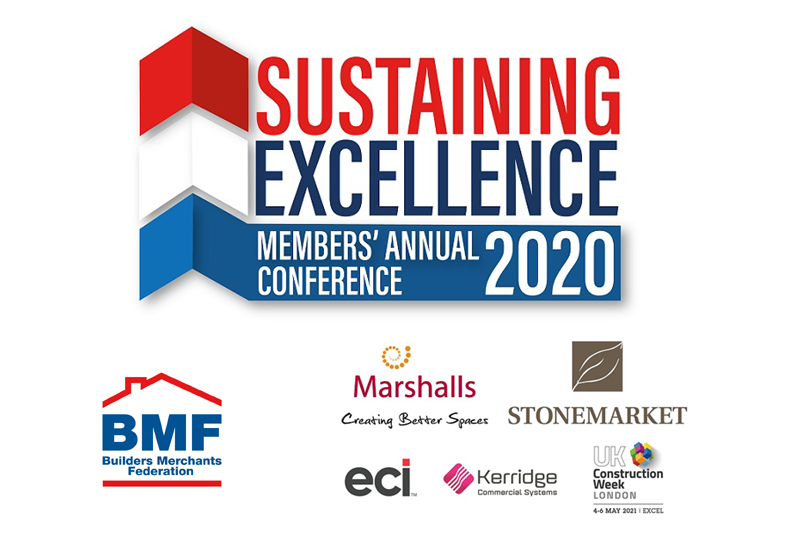
With a theme of ‘Sustaining Excellence’, the BMF’s recent Members’ Annual Conference addressed the issue of sustainable buildings — and sustainable businesses — in a changing landscape. PBM reports.
Possibly the most surreal aspect of the BMF’s virtual Members’ Annual Conference was actually how normal it all seemed. Usually a bustling, two-day event with plenty of informal networking sessions to punctuate the series of speeches and seminars, circumstances clearly precluded this tried-and-tested formula — yet as the ‘new normal’ extends into its seventh month, we have all adjusted to seeing our industry friends via Zoom.
The well-attended webinar certainly had the hallmarks of fondly-remembered past events, with plentiful discussion in the ‘chat room’ about the how the sector is battling to meet its current challenges — Covid and beyond — in addition to a parade of informative speakers who addressed pressing issues such as sustainability, training and greater industry collaboration.
With the ever-ebullient Kevin Parr as the event’s compere and following an address from BMF Chairman Richard Hill speaking at his first Conference ‘in post’, the Federation’s Financial Director, MKM’s Mark Smith, highlighted the challenges the BMF has faced in light of the coronavirus restrictions. Whilst discretionary revenues from training and events reduced, he noted that total membership has increased by 4% with overall membership income strong.
Indeed, Mark said that the level of engagement with members over the last six months has been “extraordinary”.
This was perhaps the underlying theme of BMF CEO John Newcomb’s address. Total membership is now up to 751 merchants and suppliers (up from 701 a year ago, and from 324 in 2012) whilst the 397 merchant firms now in membership is said to represent 85% of the sector.
Discussing the progress of the BMF’s ‘Building Excellence’ strategy, John introduced the ‘Project Excellence’ initiative and how the BMF intends to deliver for its stakeholders via enhanced engagement — the true benchmark for any membership organisation.
Having identified the different ‘strands’ of BMF members, the idea is to specifically target those who are currently ‘low engagement groups’ in a number of ways to develop a better solution for their needs and for the benefit of the wider membership body.
John moved on to discuss the work currently being undertaken as part of the Construction Leadership Council and its Roadmap to Recovery plan. The BMF is represented on a number of its Industry Working Groups whilst John also outlined the importance of the merchant sector supporting the recently-launched Talent Retention Scheme.
Many of these points (and more) were summarised in the following video which outlined the response of the BMF and its members to the pandemic:
Nathan Garnett, Director of UK Construction Week, next outlined how the event will take place in a virtual format this month, repurposing the conference programme that had been planned for the physical event.
Peter Hallitt, Trading Director of the BMF event’s Headline Sponsor Marshalls, then shared his experiences of running a manufacturer during Covid. Highlighting the two key issues of keeping staff and customers safe along with understanding demand and fulfilling orders, Peter stressed the need to recognise that “Covid is going to be around for some time” and the industry must act accordingly.
Marshalls, he explained, implemented its plans swiftly and has continued to revise its plans as necessary. Whilst its office staff will continue to work from home, and its reps are making full use of virtual meetings whilst they can’t be on the road as much, manufacturing is now fully operational — and capacity is actually being expanded at a number of sites as demand has bounced back strongly.
The business was “inundated” by requests from installers to find merchants that were open early in the crisis, whilst merchants were also supported by direct supplies to site where required. From an original prediction of a 15% drop in sales, forecasts are now being revised up but Peter stressed this is a fluid picture.
Of his key takeaways, he noted the importance of a resilient and collaborative supply chain — especially with the looming end of furlough and the implications of Brexit to follow.
Sustainability was the focus of a Keynote Speech from Lord Deben, Chairman of the UK Committee on Climate Change. The Conservative Life Peer drew on his experiences in politics (as plain old John Selwyn Gummer!) and business to offer an illuminating view on the roles and responsibility of both Government and industry to meet the country’s statutory requirements on climate change.
Construction, he asserted, is right at the heart of this and in addition to the significant role the new build sector has to play, he highlighted the Committee’s recommendations relating to the retrofit of existing homes and commercial buildings.
Noting his previous criticism of housebuilders for building homes in recent years that already need retrofitting to meet standards, Lord Deben clearly asserted the vital role of the merchant sector in supporting their customers to finding the right sustainable product solutions.
The sector’s building up its own understanding is critical, he said, explaining that through ‘choice editing’ merchants can steer customers towards more sustainable options and that merchants can influence change and be a “fount of knowledge” especially for smaller builders who have a plethora of information to digest.
Sustainability means profitability
His further key point was to ‘follow the money’ as sustainability can equal profitability. He said: “Five years ago, sustainability was a marginal activity — today, every single investment fund is talking about it. I’m a businessman — this is not an add-on extra; this is something you do to be profitable.”
Offering further perspective from within the merchant industry itself, Megan Adlen, Travis Perkins’ Group Head of Sustainability, drew on her 20+ years of experience in sector (one year at TP, following on from service at Ferguson and Wolseley). Sustainability, she noted, is about economic, social and environmental resilience and the increasing awareness and drive towards sustainable solutions is presenting a number of business opportunities for the industry.
Reinforced by some of the lockdown-fuelled changes in thinking, she argued that at one edn of the scale, people working from home are already showing an interest in investing in their homes to make them “more comfortable, practical and energy efficient”. Similarly, there is a need to truly ‘Build back better’ with Megan noting that lockdown enabled an 8% reduction in emmissions, but this needs to be sustained for the long term.
Customers, meanwhile, no longer just want ‘products’ but instead want solutions. Many are already looking at ‘counting carbon’ in their tenders (especially those working on public sector or social landlord projects), whilst there is a growing argument for greater ‘product provenance’ and ‘chain of custody’ measure beyond just timber.
Interaction and engagement
A panel session with Megan and Lord Deben drew on the many questions being presented by delegates in the chat room. Lord Deben, for instance, reflected more on the role of Government and said: “You can’t just wait for the Government — they will get it wrong! It should set the parameters and the end goal — for example, with housing the outcome should be zero carbon. But how you get there isn’t really the point.
“Business has to lead. Government doesn’t have that business experience, and the mechanisms that have made businesses successful can be deployed.”
In addition, Lord Deben recognised that Government should be doing more to ensure installers are properly trained and also — significantly — that there is much better building control and the enforcement of standards. He acknowledged that this is problematic at present as “local authorities don’t have the resources” but stressed that change would be much easier if “buildings could be pulled down if standards were not met.” His final reflection was telling: “If builders thought that would happen…”
Ahead of breakout sessions on leadership, BMF training and online reviews, John Newcomb outlined the details for the BMF-hosted 2021 All Industry Conference which is scheduled to take place from June 17-20 next year at the Yorkshire Event Centre near Harrogate.
Take a look at the event’s official launch video:
The full video of the BMF Members’ Annual Conference can be viewed via the Federation’s YouTub channel here:









